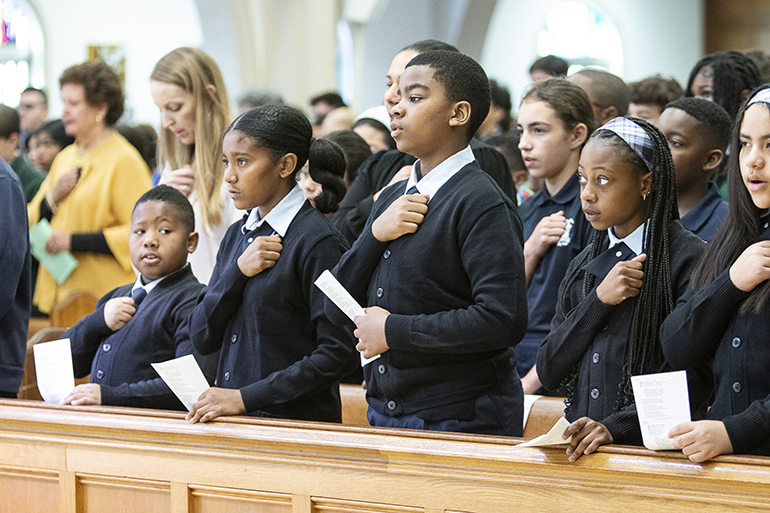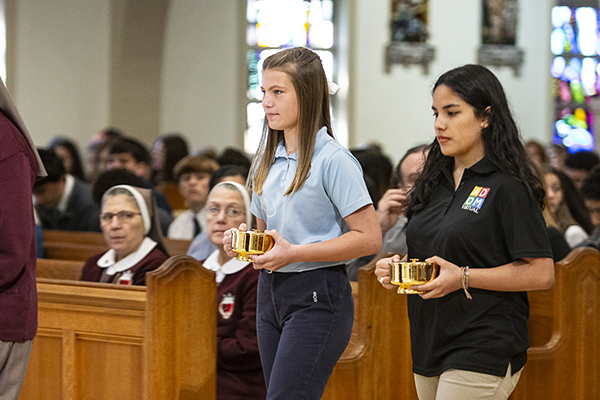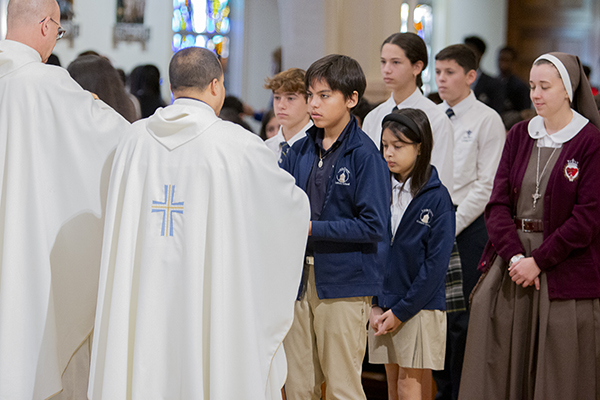By Rocio Granados - La Voz Catolica

Photographer: ANA RODRIGUEZ-SOTO | FC
Students from St. Mary Cathedral School recite the Penitential Act during the All Schools Mass at St. Mary Cathedral, Jan. 31, 2024. Representatives of all 64 archdiocesan elementary and high schools gathered at the cathedral for the second annual Mass to mark Catholic Schools Week, Jan. 28-Feb. 3.
MIAMI | In order to be more intentional about teaching the Catholic faith, the archdiocesan offices of Catholic Schools and Catechesishave developed a new religion curriculum that has been in use since the beginning of the 2023-2024 school year.
“It is important to think intentionally about how we teach the faith. Our schools are Catholic. They exist to make Jesus Christ known, loved, and served. It's what differentiates us from the public schools,” said Jim Rigg, archdiocesan superintendent of schools.
In partnership with the archdiocesan Office for Catechesis and its director, Sister Karen Muñiz of the Servants of the Pierced Hearts of Jesus and Mary, a committee of school principals, teachers and directors for religious education, plus several priests, reviewed the previous archdiocesan religious studies curriculum and compared it to other models in the country. The goal was to “develop new instructional standards for both our Catholic schools and our parish religious education programs,” Rigg said.
"The standards are one of the essential elements of Catholic education, and Catholic education must contribute to the evangelizing mission of the Church," Sister Karen said. Through these educational standards, "students receive a synthesis of culture and faith, in a comprehensive formation, not only intellectual, but moral, spiritual, academic, which they will apply in real life," she said.

Photographer: ANA RODRIGUEZ-SOTO | FC
From left, Kinsley Hamilton of St. Coleman School, and Natalie Quiceno of the Archdiocese of Miami Virtual School, take up the offertory gifts during the All Schools Mass at St. Mary Cathedral, Jan. 31, 2024. Representatives of all 64 archdiocesan elementary and high schools gathered at the cathedral for the second annual Mass to mark Catholic Schools Week, Jan. 28-Feb. 3.
The new curriculum, which is also being used for religious education in the parishes, places emphasis on teaching the faith so that the children know and understand the basics and can begin to apply it in their lives.
"If they don't know it, they will not have that encounter with Christ; if we don't begin to know more about him, how are we going to get closer to him? How are we going to be able to serve our neighbor?" said Gabriel Cambert, educational development director for the Office of Schools.
To this end, teachers have a very important role to play. "We teachers know that we can't just use a book (to teach). It has to be something dynamic; through these particular teachings, we have to show children how beautiful our faith is," Cambert added.
EVERYONE TEACHES RELIGION
There are 64 Catholic schools and four independent preschools in the Archdiocese of Miami, which includes Miami-Dade, Broward and Monroe counties. These schools, from pre-K through 12th grade, serve more than 35,000 students, providing them with an education rooted in the Catholic faith. In addition, religious education programs are offered at the 109 archdiocesan churches and missions for children who do not attend Catholic schools.
Most Catholic educators are neither consecrated religious nor priests. But teachers in Catholic schools, whether they teach physical education, art, kindergarten or math, are religious educators.
“As educational leaders, we are charged with making sure that our teachers are constantly growing in their faith because they're the ones who are doing the essential work of evangelization in our Catholic schools,” Rigg said.

Photographer: ANA RODRIGUEZ-SOTO | FC
Representatives of all 64 archdiocesan elementary and high schools receive Communion at the second annual Mass to mark Catholic Schools Week, Jan. 28-Feb. 3. The Mass was celebrated Jan. 31, 2024, at St. Mary Cathedral.
From the moment they are hired, teachers go through a regular process of catechetical formation, regardless of whether they teach math, English or science, "so they can answer questions or guide students to where they can find the answers," Sister Karen said.
The Catechist Formation Program teachers must complete consists of four initial courses on the pillars of the faith: The Creed; Introduction to the Liturgy and Sacraments; Introduction to Catholic Morals; and Introduction to Sacred Scripture. Later, they take more courses, and attend retreats and the annual archdiocesan Catechetical Conference, among other programs and events.
"Our new religion curriculum standards provide for cross-curricular faith integration, so tools are provided to help teachers incorporate the Catholic faith into non-religious subjects," Rigg explained.
STEAM education, for example, which stands for science, technology, engineering, art, and mathematics, becomes STREAM in Catholic schools because it includes religion. "It's an opportunity to combine all that content and integrate faith," Cambert said.
Religion is one of the six core subjects taught every day in archdiocesan schools, "and teachers have to be certified as catechists even if they are teaching history," Cambert said. "If we are teaching about the history of the Hebrews, we can integrate it into the Old Testament. Teachers will do it seamlessly enough that students can also learn such human history through the lens of our faith."
Most archdiocesan schools lack the presence of religious men and women as examples of the faith. However, from preschool on, students get an insight into vocations so that they know what it means to discern a vocation and the different vocational possibilities.
PARENTAL INVOLVEMENT
Parental involvement is important in a child's faith formation. Church documents point out that parents are the first educators of their children.
But the reality is that "not every parent is particularly well formed in their faith. Therefore, as Catholic educators, part of what we need to do is to equip parents with the knowledge they need to become the primary educators of the faith," Rigg said, adding that the new curriculum includes resources to help religious education teachers and directors empower parents to do just that.
"We realized that, in many cases, parents are no longer teaching basic prayers to their children because they are not sufficiently catechized or are not practicing the faith. So we intentionally added a whole appendix in the new curriculum, with the basic prayers they should know, beginning with the sign of the cross," said Sister Karen.
"The domestic Church tells us that parents are the first educators of their children,” Cambert said. “As schools and as religious programs, we have to facilitate encounters for those parents, with activities that include opportunities for them to find the faith. And if they can only do just one thing, let them start with attending Mass every Sunday as a family."
LEARN MORE
Hear the complete interview about the new religious education curriculum on the podcast "What the Faith, Miami."

